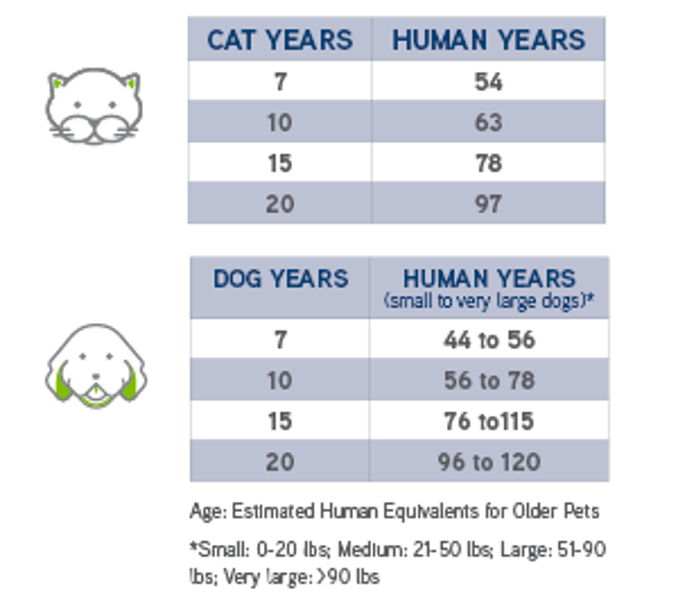In this era of modern veterinary medicine, our beloved pets enjoy longer lifespans as cherished members of our families. However, with extended lifespans come age-related challenges that affect our furry friends. Our senior pet care guide aims to educate pet parents on providing top-notch care for their senior pets.
How Old Is My Pet?
A good start is to keep up with your pet’s age and what to expect from their age. For example, here is an age chart for cats and dogs:

Changes to Watch for in Senior Pets

Here are some common changes to expect as your pet ages.
Impaired sight or hearing
Like humans, it is normal for pets to lose some of their sight and hearing as they age. Older pets can develop cataracts. Regarding their hearing, they may respond differently to voice commands or not respond at all. But pets have a more acute sense of smell than we do. They will depend on this more as they age. They will use scents to be familiar with things around them. You can help them by limiting changes to their environment.
Arthritis
The most common type of arthritis in pets is Osteoarthritis (degeneration of joint cartilage and the underlying bone). Typical signs of arthritis are difficulty moving or limping. A pet with arthritis may also show irritation when touched or petted (especially over the arthritic areas) and may seem more depressed or irritable.
Two significant contributors to arthritis are a sedentary lifestyle and obesity. Maintaining your pet at a healthy weight and regular exercise can help prevent or alleviate arthritis.
Incontinence
Aging pets commonly experience some degree of incontinence, usually urinary. You may notice urine dribbling. Older pets can develop weak pelvic floors or poor bladder tone, resulting in urinary incontinence. However, there are other causes of incontinence, such as urinary tract infections. So, if you notice any continence changes, please call us.
Dementia
Dementia may not be as common as the other symptoms above but as pets are living longer, you should be aware of these symptoms.
Dogs:
- Sleeping more.
- Losing interest or becoming apathetic.
- Intermittent anxiety expressed by apprehension, panting, moaning, or shivering.
- Forgetfulness includes forgetting commands, not recognizing objects, no longer being housetrained, and getting stuck behind furniture.
- Becoming overly aggressive.
Cats:
- Disorientation, such as failing to identify people or places or getting lost.
- Less interaction with other pets or people.
- Change in sleep habits. May sleep more during the day but wander around more at night, often accompanied by crying out for no apparent reason.
- Loss of housetraining skills because they need help finding the litter box or have lost interest in keeping themselves clean.
6 Tips for Helping Your Pet as They Age
1. More Frequent Vet Visits.
Yearly checkups are essential to keep your pet healthy. However, as pets age, they become more susceptible to diseases and other medical conditions. Consult Dr. Lowenstein on how often you must bring your pet in for a wellness check. And please check out our special offer for a discount on an exam fee for new patients.
2. Monitor Their Weight.
Pets’ nutritional needs change as they enter different stages of their lives. At Braescroft Animal Clinic, we offer nutritional counseling. If your pet is overweight, consult with Dr. Lowenstein so she can guide you on the best diet and exercise program for your pet.
3. Keep Them Exercising.
As your pet ages, adjust their exercise to their abilities. They may have once been able to go on runs with you but now may only be able to tolerate a slower or shorter walk. Whatever physical activity they can manage, keep them at it.
4. Keep their Teeth and Gums Healthy
Most dogs and cats have some degree of periodontal disease by age 3. If left untreated, these pets are at an increased risk of developing heart valve and kidney disease. Establishing good oral hygiene habits for your pet is essential in battling dental disease. Dogs and cats also can’t tell us when their mouth hurts. They often stop eating when they need dental care.
5. Help Them with Grooming
As pets age, it can become difficult for them to groom themselves adequately. Daily grooming your pet will help their coats stay healthy and is a great way to give them some love and attention.
6. Adjust Their Environment as Needed.
You may need to make some environmental adjustments as your pet ages, and they cannot see, hear, or move as well as before.
- Pet stairs or ramps. A pet stair or ramp can help them get up on your couch or bed and cuddle with you or climb up into their cat tree. Stairs can also help dogs get in and out of your car.
- Secure their environment. Always keep dogs on a leash when they are outdoors. Keep your cat in a secured patio (catio), porch or, indoors. There are companies such as The Purrfect Fence where you can purchase cat fences or catios online to keep them safely in your yard.
- Provide them with a comfortable bed. An orthopedic bed or heated bed could make a big difference in their sleeping comfortably and relieving arthritic pain.
Final Words
We hope you find this senior pet care guide helpful in caring for your pet in its golden years. of these symptoms apply to exotic pets as well. However, we do not recommend self-diagnosis. There can be more than one cause for any one of these symptoms. But you can help your pet by observing what is going on with them and sharing this data with Dr. Lowenstein at your pet’s next exam so she can accurately diagnose your pet. If your pet has not had a checkup within the last year, contact us and schedule an exam.
Sincerely,
Your Friends at
Braescroft Animal Clinic





